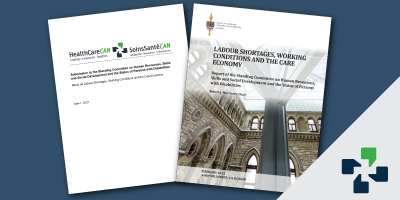On February 6, 2023, the Standing Committee on Human Resources, Skills and Social Development and the Status of Persons with Disabilities’ (HUMA) much anticipated report on Labour Shortages, Working Conditions and the Care Economy was tabled in the House of Commons.
HealthCareCAN is pleased to see that several of the recommendations outlined in our submission to the Committee are included in its final report, specifically:
- Coordination between all levels of government on a pan-Canadian approach to enhance the collection, quality and comparability of labour market information in healthcare, and to conduct and disseminate analysis of this information for use in workforce planning.
- Implement and monitor any workforce planning strategies for the care economy, including a centralized health care human resources strategy.
- Expand training and upskilling opportunities and capacity for the care economy and healthcare workers.
- Review federal skills and employment programs that target groups that are underrepresented in the labour market, such as Indigenous peoples, persons with disabilities, youth, and women, with a view to ensuring they align with current and future skills needs as well as examine additional ways to support the labour market participation of these groups.
- Remove barriers to labour mobility in the healthcare sector, including through the interprovincial/territorial coordination of regulation and licensing requirements.
- Proceed with the implementation of a Trusted Employer Model to fast-track Labour Market Impact Assessment (LMIA) applications from eligible employers and review LMIA application processing practices and resource allocations to eliminate red tape and to ensure LMIAs can be processed in a timely, predictable and efficient manner.
- Investigate ways, where appropriate, to connect employers with qualified newcomers.
“It is encouraging to see the Committee endorse the recommendations HealthCareCAN and our members, including our Health Human Resources Advisory Committee, advanced in our submission,” says Paul-Émile Cloutier, President and CEO of HealthCareCAN. “Health workforce pressures are the greatest challenge our health system is facing right now, and we need urgent, immediate, and collaborative action by all levels of government to implement solutions that will better support healthcare workers across the health system and enhance care for people across Canada.”
The report outlines 16 recommendations and covers a breadth of concerns within the care economy. The Committee endorses the need for better labour market information, a centralized healthcare human resources strategy, improved skills and training opportunities and accessibility, labour mobility, and labour participation support for underrepresented populations including Indigenous peoples, persons with disabilities, youth, and women.
The Committee backs changes to the immigration and licensing process to tap into the skills of internationally educated health professionals and allow them to get working in the health system more quickly and easily once they arrive in Canada.
The recommendations also include implementing incentives to attract healthcare providers to rural and remote communities, exploring additional ways to address workforce shortages in these areas through temporary and permanent immigration, and continuing efforts to improve broadband access in these regions.
Finally, the Committee calls for improving compensation and benefits, working conditions, and mental health and wellness for healthcare workers and workers in the broader care economy.
“We know that we need to be focusing on retention, recruitment, and long-term planning for both our health system and health workforce,” noted Cloutier. “The Committee’s emphasis on improving the immigration and licensing processes for both newcomers and professionals moving within Canada, coupled with a focus on expanding training and education opportunities and engaging in better health workforce data gathering and planning, provide a good balance between the short- and longer-term focus our members have indicated we need to be taking when it comes to Canada’s health workforce.”
HealthCareCAN eagerly awaits the federal government’s response to the report and will be following up with members of Parliament and government officials to push for the implementation of the Committee’s recommendations.
Related:

HealthCareCAN’s submission to the Standing Committee on Finance’s Pre-Budget Consultations in Advance of the 2025 Federal Budget – Read now!

No summer slowdown as HealthCareCAN keeps influencing implementation of budget commitments
Summer 2024 is shaping up to be even busier than usual as the federal government moves ahead in implementing the federal research system reorganization outlined in Budget 2024. As part of our post-budget engagement with government, HealthCareCAN continues to connect with federal representatives to learn more about the government’s implementation plans and influence their approach.

HealthCareCAN’s submission to the federal research granting councils consultation on the creation of a new capstone research funding organization – Read now!

HealthCareCAN continues to “work the details” of federal budget promises
Deputy Prime Minister and Finance Minister Chrystia Freeland may have stood up in the House of Commons to formally deliver the 2024 federal budget nearly two months ago, but the policy and legislative work is far from over. Key areas of activity for HealthCareCAN include pressing the government to ensure health researchers in healthcare organizations

HealthCareCAN supports the Weeneebayko Area Health Authority in letter to The Honourable Patty Hajdu
May 24, 2024 The Honourable Patty Hajdu Minister of Indigenous Services and Minister responsible for the Federal Economic Development Agency for Northern Ontario House of Commons Ottawa, Ontario K1A 0A6 Dear Minister Hajdu, We are writing to you today to add our voice and support to the calls by the Ontario Hospital Association (OHA) and


